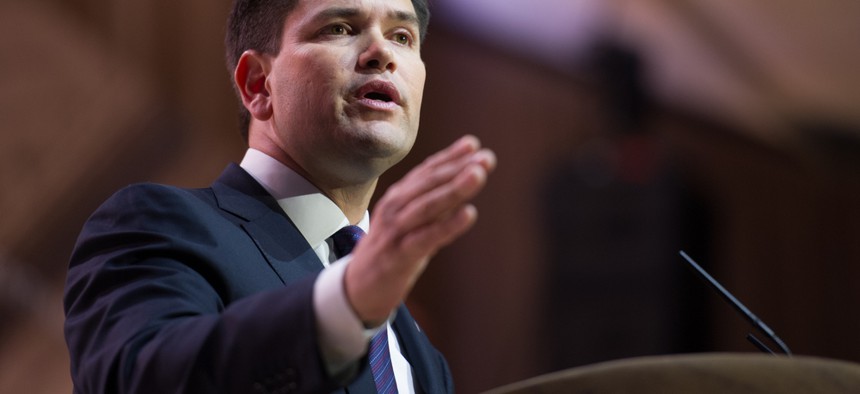
Christopher Halloran / Shutterstock.com
Amid Homeland Security Funding Fight, 2016 Hopefuls Avoid the Front Lines
Cruz, Paul, and Rubio could use the standoff to distinguish themselves. So far, they're not.
With just a week's worth of legislative days to go before the Department of Homeland Security shuts down, Republicans don't seem to have a strategy to fund the department and respond to President Obama's actions on immigration.
And the senators who hope to run the party— and the country—are nowhere to be found.
The DHS fight should be the perfect opportunity for Sens. Ted Cruz, Rand Paul, and Marco Rubio to stake out claims on immigration and federal spending and to exhibit their ability to lead the party in finding a new way forward. But all three have been largely silent.
In the four weeks since Senate Majority Leader Mitch McConnell brought the House-passed DHS spending bill to the floor, not one of the three would-be presidential candidates has spoken on the floor about the issue (Rubio skipped one of those weeks entirely in order to fundraise for a presidential bid).
All three agree that the Department of Homeland Security should be funded. All three blame Democrats for filibustering the bill. And all three want to see Obama's 2014 executive action overturned. But what none of them are saying is how.
Of the three, Cruz has been the most active on the issue. The Texas firebrand worked with Republican Sen. Susan Collins of Maine to push an amendment to dilute the House's bill in the hopes of attracting more Democratic votes —or, at the very least, to get Democrats who said they had concerns about Obama's executive action on the record in voting to maintain funding for it. Cruz also argued that the Senate should not approve any of Obama's nominees until the immigration issue had been resolved.
Neither plan panned out. Democrats balked at Collins' amendment and the movement has lost steam. Meanwhile, Cruz voted to approve Michael Botticelli to be the director of National Drug Control Policy earlier this week, and Senate Republicans are expected to vote Thursday to confirm a new secretary of Defense.
Cruz has repeatedly told reporters that the Senate should do everything in its power to put a stop to Obama's "illegal executive amnesty." But asked Wednesday how the Senate should proceed, Cruz called on Democrats to stop filibustering, calling it "both reckless and irresponsible." In the face of that Democratic obstinance, like many of his colleagues, Cruz hasn't offered a way forward.
After offering similar thoughts to reporters Tuesday, Cruz walked into a meeting with the full Republican conference and didn't say a word about the issue, as Politico reported.
This is in strong contrast to Cruz's past pushes on immigration. Cruz used procedural measures in December to block the Senate from considering legislation to keep the government's doors open over the president's executive action. Those moves kept the Senate in Washington for days after they were scheduled to recess for the holidays. Several times in the past two years, when his leadership was unable or unwilling to pursue his agenda, Cruz has huddled with House conservatives to secure their help. This time around, nothing.
Paul and Rubio have been even quieter.
While Paul has repeatedly railed against federal overreach on the Senate floor and in the press, he's spoken little on the DHS bill. Paul introduced his own legislation in December to overturn the president's executive action, similar to the language included in the House bill, and plans to reintroduce the measure this year, according to staff.
"The President is not a king and he does not have the power to enact laws then execute his own laws. Our Constitution is being violated by this executive order and other actions by the Obama Administration to govern by executive fiat," Paul said in a statement.
But with Congress at the brink of a DHS shutdown, and the possibility of a clean funding bill that ignores the president's executive action still on the table, Paul has offered little in the way of a path forward.
Asked late last month—when it was already clear that Democrats would block the House bill—what Congress should do, Paul said he didn't know. "I think that's a good question. I don't know if I have an answer," he said.
Rubio, who missed early strategy sessions on the issue both on Capitol Hill and at a retreat in Hershey, Pa., last month, also has kept his cards close to the vest. Asked why he was taking a backseat on an issue he's passionate about like immigration, Rubio blamed Democrats. "There is no front seat on this issue, we're not on the bill. We can't even file amendments," Rubio said Wednesday.
Once there's a bill on the floor, Rubio said he will be "happy to offer my ideas," but in the meantime he's focused on the business before the Senate. "In the absence of that, I'm going to focus on the issues that there are actually work being done on because the Democrats refuse to even go on the bill. … They've refused to even allow a debate to begin on it. So there's nothing else we can do about it," he said.
Rubio has distinguished himself from his colleagues on the issue somewhat, however. The senator from Florida has said he would not support overturning Obama's 2012 executive action staying deportation for children brought to the country illegally, as the House bill does. Removing that measure was a key aspect of Collins' amendment, which Cruz supported. Unlike Rubio, Cruz has said that he would like to repeal the DACA order, but he'd prefer to do it separately from the DHS fight.
In staying mum on what to do about the DHS spending bill, Cruz, Paul and Rubio are echoing their leadership. All through this week, Senate Republicans have said that it is now up to the House to find a way forward, even as House Republicans and particularly Speaker John Boehner have said the ball remains in the upper chamber's court. All of them want the same thing, but haven't specified how to get there.
(Image via Christopher Halloran / Shutterstock.com )
NEXT STORY: Degrees Don’t Matter Anymore, Skills Do







